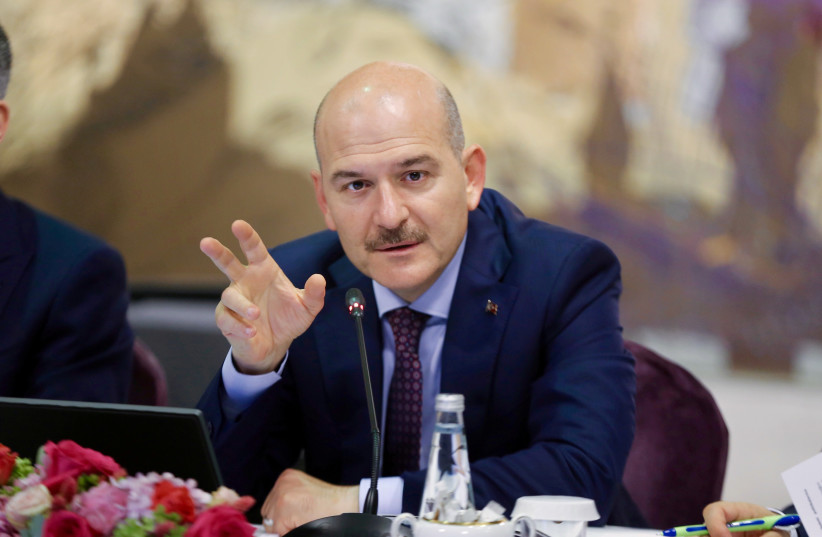Turkish President Recep Tayyip Erdogan and his allies are ratcheting up rhetoric on socially conservative values ahead of what is expected to be his toughest election in his nearly 20 years in power.
For more stories from The Media Line go to themedialine.org
Erdogan has suggested changing the constitution to guarantee a woman’s right to wear a headscarf and to protect families from “perverse trends,” which activists and analysts believe is aimed against the LGBTQ community.
On Saturday, Interior Minister Süleyman Soylu compared the LGBTQ community to terrorism and contended that the top opposition party’s leader would allow same-sex marriage.
“There is cultural terrorism. The propaganda of a terrorist organization, which tries to make people forget their values, their religion, unity, parental love and family loyalty. It is exactly Europe's policy, exactly America's policy of divide and rule.”
Turkish Interior Minister Süleyman Soylu
“There is cultural terrorism. The propaganda of a terrorist organization, which tries to make people forget their values, their religion, unity, parental love and family loyalty. It is exactly Europe's policy, exactly America's policy of divide and rule,” Soylu said, according to Turkish news outlet Duvar.
“What will happen? They will bring LGBT to Turkey. Forgive me, men will marry men, women will marry women,” he also said.

When did Turkey's Erdogan first start targeting social issues?
Fatma Aytac, a co-chair of the Women’s Party of Turkey, said that Erdogan first started targeting social issues when Turkey withdrew in July 2021 from the Istanbul Convention, an international treaty which increases protection for women who have suffered domestic abuse.
The Turkish president claimed that the convention paves the way for gay marriage, despite no mention of it in the international agreement.
“They are trying to consolidate their votes, showing the LGBT community, their lifestyle, is against the family description,” Aytac told The Media Line.
She said the right to wear a hijab already is guaranteed in the constitution under freedom of expression and argues that adding a specific section on a woman’s appearance could allow future restrictive laws on clothing.
Turkey’s struggling economy, with an official inflation rate sitting at more than 80%, has forced Erdogan to battle for his political survival.
Polls consistently show him losing in head-to-head races against several opposition politicians, although recent figures have seen him slowly bouncing back.
“The economic crisis is really hurting the electorate and is sort of hemorrhaging votes from the governing bloc,” Berk Esen, an assistant professor of political science at Istanbul’s Sabanci University, told The Media Line.
“Erdogan is desperately shifting in terms of the political debate and finding new issues, preferably cultural issues, to polarize the electorate and continue to sort of convey this message to his conservative supporters, that only he could protect their interests.”
A law regarding the headscarf was first suggested by Kemal Kilicdaroglu, the leader of Turkey’s opposition, the secularist Republican People’s Party (CHP).
Secularists banned the wearing of the hijab in state institutions, such as universities, after the founding of the Turkish republic.
Erdogan, who leads the Islamist Justice and Development Party (AKP), lifted the ban in 2013.
Secularist opposition politicians have strained to show they are accepting of women who wear the hijab in the hopes of increasing support for CHP, whose last presidential candidate received about 30% of the vote in 2018.
Kilicdaroglu is expected to be the presidential candidate for the opposition coalition, despite polls suggesting other possible contenders for the opposition would more strongly beat Erdogan.
Esen said that Kilicdaroglu’s decision to bring up the headscarf issue created division with the CHP’s secularist base.
“That might prove consequential during the candidate nomination process,” Esen said. “I think this would really weaken Kilicdaroglu’s chances.”
While Erdogan’s coalition has a majority in parliament, it does not have enough seats to change the constitution.
The idea of a referendum on the proposed constitutional amendment was floated, but Erdogan said he would work with political parties in the parliament.
Local reports say AKP officials spoke with the pro-Kurdish Peoples' Democratic Party, or HDP to try to garner enough votes to pass the amendment.
The AKP has accused the HDP of supporting terrorism, tying them to the outlawed Kurdistan Workers’ Party (PKK).
Esen believes Erdogan will continue to turn to social issues, such as abortion, but is doubtful that such a strategy will be very successful because he does not believe it will mobilize many voters.
“Whatever [Erdogan] could find, he’ll come back and use and he’s used it with some effect over the years,” Esen said. “[But] there’s a limit to what he can do; voters have already been polarized.”
